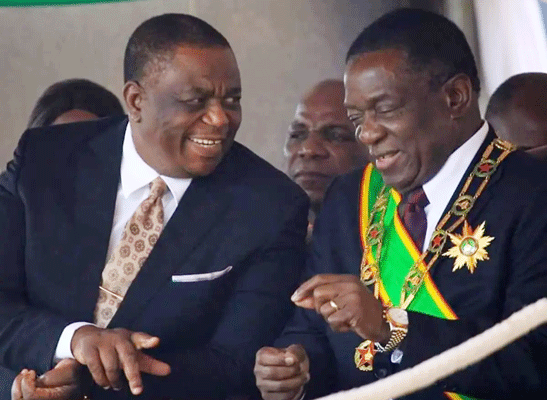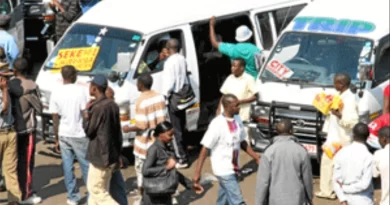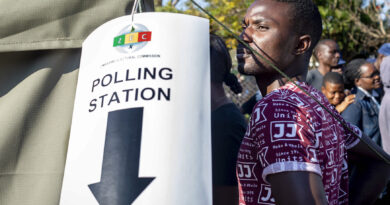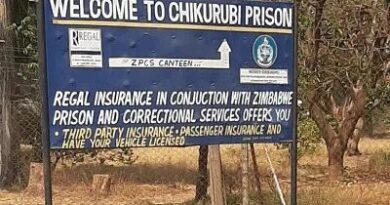Mnangagwa bashes Chiwenga’s presidential ambitions
Zanu-PF co-deputy president Constantino Chiwenga, who harboured succession ambitions in the hope that President Emmerson Mnangagwa would step down after completing two constitutional terms, has been thrown into disarray by his boss’s rapidly burgeoning third-term bid which is trashing their 2017 military coup pact.
Informed sources say the original agreement from the 2017 military coup was that Mnangagwa would complete Robert Mugabe’s term and serve one other term in order to give the power-grab a civilian face to avoid outright condemnation from regional and international blocs, before handing over power to his coup ally, Chiwenga, to run the 2023-2028 term.
The agreement was however tweaked at Zanu-PF’s last elective congress held in 2022 where Mnangagwa manoeuvred to become the party’s candidate in the 2023 elections to complete two terms.
At that stage, allies of Chiwenga said the former military commander was taking a strategic retreat with the aim of fighting back and taking over power after Mnangagwa’s two terms that are set as the limit by the national constitution.
However, with Mnangagwa’s third-term bid campaign in full swing, the big question is inevitable: What next for Chiwenga? At the last 7th Zanu-PF congress, Chiwenga conceded defeat and proclaimed Mnangagwa as the leader of Zanu-PF, but he was hopeful of taking over in 2028.
Earlier on, Chiwenga had suffered setbacks in his spirited fight for the post of party president, including a one-year break, when he was battling for his life in hospitals, the death of his trusted generals Perrance Shiri and Sibusiso Moyo and a dwindling support base within the army where Mnangagwa made changes mainly for coup-proofing.
The convening of the congress was challenged by Zanu-PF youth Sybeth Msengezi, but the case predictably dragged on in the courts.
What happened to Chiwenga was a similar script to what took place in 2004 when eight provinces had endorsed Mnangagwa as vice-president of the party. As secretary for administration, Mnangagwa was made to announce that the second vice-president would be a woman, and Joice Mujuru got the coveted slot ahead of Mnangagwa.
Chiwenga’s ouster from the race at the last party congress was the outcome of a premeditated plan by Mnangagwa since 2017. Cautious of being ousted by Chiwenga and his faction, Mnangagwa had avoided the scheduled 2019 congress after his controversial ascendancy through a central committee meeting held on 19 November 2017 at party headquarters in Harare.
An extraordinary congress was held in December 2017 to install him as party leader, but the constitutional processes were not followed to the letter and spirit of the law.
Zanu-PF youth member Musengezi, publicly viewed as Chiwenga’s proxy, challenged Mnangagwa’s legitimacy in the courts. He wanted the congress stopped until that matter had been resolved, but Zanu-PF forged ahead all the same.
Zanu-PF insiders say Chiwenga lost political ground when he fell ill and almost died between 2018 and 2019. From there, they say, he never quite recovered even though his faction has remained intact, with potential to regroup and fight back ahead of the 2028 elections. Mnangagwa’s third-term bid campaign became public last week when Zanu-PF Masvingo province coined a slogan for it during the ruling party’s Youth Day celebrations.
The slogan, “2030 VaMnangagwa vanenge vachipo [Mnangagwa will still be in power in 2030]”, is now being chanted at Zanu-PF events.
The party’s Masvingo provincial chairperson, Robson Mavhenyengwa, chanted the slogan at Mushagashe Vocational Training Centre during the main National Youth Day celebrations. However, even before that, recalls of opposition Citizens’ Coalition for Change (CCC) MPs by self-imposed secretary-general Sen gezo Tshabangu had already been part of the scheme.
A study by a think-tank, the Zimbabwe Democracy Institute (ZDI), has shown that the recalls fed into the grand scheme of Mnangagwa’s third-term ambition.
Part of the ZDI study report said: “The recalls, which have been affected by the ruling Zanu-PF party’s Speaker of Parliament, who is the secretary of legal affairs in its Soviet-style political bureau (politburo) intends to reduce the opposition’s representation and increase the ruling party’s chances of achieving a twothirds majority in Parliament,” the ZDI said.
“Whereas the recalls may be misconstrued to be a microcosm of internal opposition CCC squabbles, they feed into a broader dual securocratic state consolidation project. “That of countering the internal and external legitimacy challenges exposed by the opposition on one hand, and on the other hand weakening the opposition’s power in Parliament to pave way to President Mnangagwa’s third-term power ambitions,” the ZDI said.
Source – newshawks




